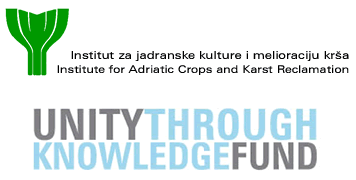The olive (Olea europaea L.) is one of the most important fruit species in the Adriatic part of Croatia. The area under olive cultivation has been continuously growing in the last two to three decades and the orchards changed their genetic structures under constant introduction of foreign cultivars and spreading of autochthonous cultivars to the new growing regions. The choice of cultivars and its distribution within the orchards determines in a great extent fertilization success, fruit set levels, and consequently the productivity of olive orchards, which are all determinants for profitable olive production. Given an increasing introduction of the new olive cultivars in the growing regions, the olive growers need a constant update of information on the reproductive compatibility between different cultivars combinations that occur in new environments.
The aim of the proposed research is to assess the compatibility relationships in the main Croatian olive cultivar ‘Oblica’, and to elucidate the pollen-pistil interactions by assessing the role of specific lipid transfer proteins (LTPs) in this crosstalk. In this novel approach, the molecular techniques, microsatellites and paternity analysis will be employed in identification of the most successful pollenizers of ‘Oblica’ and in assessment of the self-incompatibility level. Results about compatibility will be correlated with the data on flowering periods of studied cultivars under field conditions. The study of the role of LTPs in pollen tube growth and guidance, their localization in the pistil structures will deep our knowledge of the reproductive processes determining two opposite responses after pollination, the compatible or incompatible reaction.
With this project we will develop the new tools and approaches in the assessment of the compatibility relationships in the olive cultivars. The project will help to create new guidelines for producers regarding the orchard designs and establish a scientific network that will connect our researchers around the new research subject, raise institutional capacities in the methodology currently non-existent in Croatia and strengthen the capacities for application to other sources of funds.
Project leader: dr. sc. Gabriela Vuletin Selak
Project co-leader: dr. sc. Petar Pujić
Duration of the project: 16th October 2017 – 15th January 2019
———————————————————————————————————–
Maslina (Olea europaea L.) je jedna od najvažnijih voćnih vrsta jadranskog dijela Hrvatske. Površine pod maslinicima su neprestano rasle u protekla dva do tri desetljeća, a strukture maslinika su se promijenile pod utjecajem stalnog unošenja stranih sorti i širenja domaćeg sortimenta u nova uzgojna područja. Izbor sorti i njihov raspored određuju uspjeh oplodnje, postotak zametanja plodova te produktivnost maslinika, što su sve preduvjeti uspješne maslinarske proizvodnje. U uvjetima pojačanog unošenja novih sorti u nova uzgojna područja, maslinari trebaju nove informacije o reproduktivnoj kompatibilnosti među sortama u novim okolišnim uvjetima. Cilj predloženog projekta je odrediti kompatibilne kombinacije kod najznačajnije hrvatske sorte Oblica te rasvijetliti kompleks pelud-tučak istraživanjem uloge lipid transfer proteina (engl. lipid transfer proteins; LTPs) u tom međudjelovanju. Novim pristupom u istraživanju reproduktivnih procesa, koristit će se molekularne tehnike, mikrosatelitni markeri i roditeljski test u određivanju najuspješnijih oprašivača sorte Oblica te uspjeha samooplodnje. Rezultati o kompatibilnosti pojedinih kombinacija, povezat će se s razdobljima cvjetanja sorti. Određivanje uloge LTPs u rastu i usmjeravanju peludnih mješinica te njihovo lociranje u strukturama tučka produbit će naša znanja o reproduktivnim procesima koji određuju dva različita tijeka događaja nakon oprašivanja, kompatibilnu ili inkompatibilnu reakciju. Ovim projektom će se uvesti novi alati i pristupi u određivanju kompatibilnosti među sortama maslina. Rezultati projekta će pridonijeti stvaranju novih smjernica za proizvođače vezanih uz planiranje podizanja nasada. Projektom će se uspostaviti znanstvena mreža koja će okupiti znanstvenike oko nove znanstvene teme, razviti nove znanstvene metodologije koje nisu bile prisutne u Hrvatskoj te ojačati kapacitete za prijavljivanje na druge izvore financiranja.
Voditelj projekta: dr. sc. Gabriela Vuletin Selak
Suvoditelj projekta: dr. sc. Petar Pujić
Razdoblje trajanja projekta: 16. listopada 2017. – 15. siječnja 2019.
